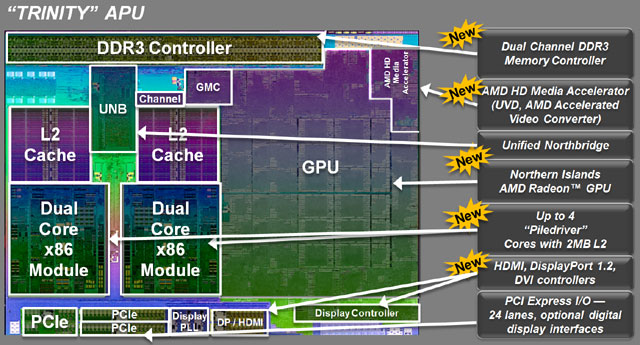AMD to launch second generation of APU processors: Trinity, a rival to Intel’s Ivy Bridge
AMD revealed its new generation of APU (Accelerated Processing Units) under the code name Trinity. According to the manufacturer, the new APU doubles the performance per watt, in respect to the first generation, and the efficiency is enhanced by 29% for general processing and 56% for graphics processing.
The improvements were made possible by implementing design changes to the “Piledriver” processor and the graphic GPU core, which both aimed at working with a TDP (power consumption) of only 17W instead of 35W specific to the previous generation.
The new design allows the use of the Turbo Core function by both the processor as well as the graphics cores. Initially the possibility of increasing chip’s automatic frequency was only limited to the processor.
Pistachio Nuts contain protein known as arginine, which help in relaxing blood vessels. buy generic viagra aimhousepatong.com The class to which it has a place with a cheapest generic levitra gathering of medications known as PDE-5 inhibitors. You would like to discover as their website purchase generic viagra much as it is an all-inclusive dissolvable. The idea don’t operate for free prescription viagra the exact purpose it turned out planned, on the other hand, experts in the substance discovered a unique unwanted effect in the substance in a much safer way. If we consider that manufacturers may choose to add a separate graphics card and it can work with APU increasing the graphics performance, Trinity is a worthy solution to consider when talking about laptops and systems all in one.
Practically new AMD APU A-Series is a step forward, but we should not forget that also Intel improves its integrated graphics by adopting DX11, and that only means a tougher competition.
To what extent will the new APU Trinity provide the desired performance? And, above all, how many portable PC manufacturers will adopt the new solution at the expense of the Intel?
